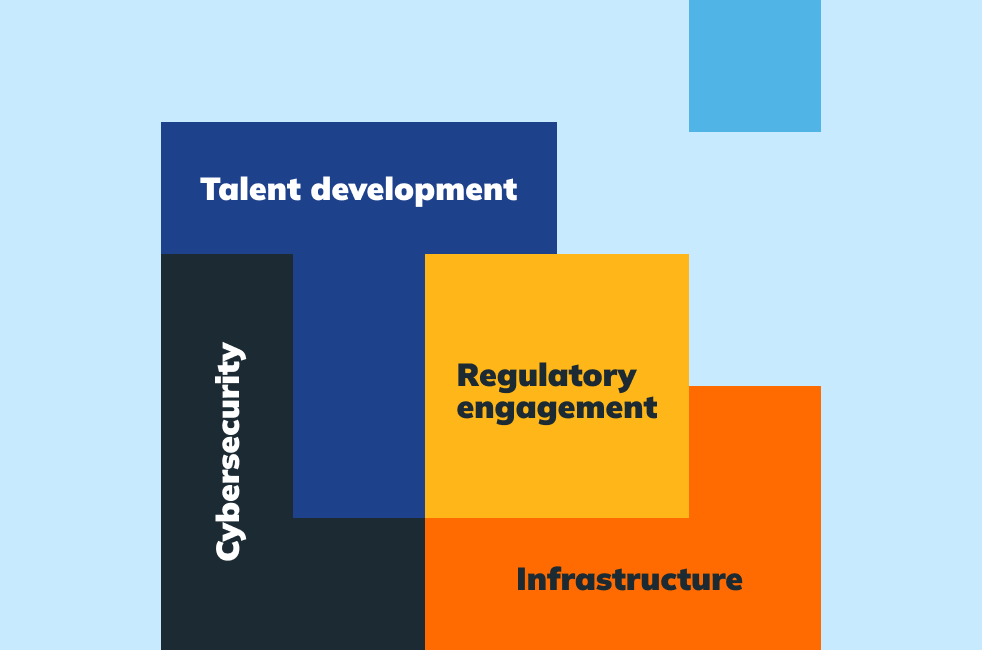
Digital Transformation in the Energy Industry: Empowering the Future
In an era where technological advancements are reshaping industries, the energy sector stands at the forefront of innovation. According to the World Economic Forum (WEF), utilities are not only adapting to this digital transformation but are redefining the way they operate. A significant breakthrough comes in the form of predictive maintenance analytics, a game-changer that is revolutionising the landscape. The WEF highlights that by deploying these advanced analytics, utilities are not only improving uptime but also significantly reducing overall maintenance costs, marking a paradigm shift in the traditional approach to service reliability.
As we delve into this transformative journey, it becomes evident that the integration of predictive maintenance analytics is not just a technological upgrade; it’s a strategic move that amplifies both the quantity and quality of maintenance schedules. PPL Electric, for instance, stands as a testament to the tangible impact of this evolution, reporting a remarkable 38 percent improvement in service reliability. In this article, we will unravel the profound implications of predictive maintenance analytics in the energy sector, exploring how it is reshaping the way utilities approach maintenance, enhance service reliability, and pave the way for a more resilient and efficient future.
Embracing the Digital Imperative in the Energy Sector
In today’s dynamic landscape, the energy sector finds itself at a crossroads, compelled to embrace digital transformation to remain competitive and sustainable in an ever-evolving environment. The growing importance of digitalisation in this industry cannot be overstated, as it represents a fundamental shift towards agility, flexibility, and data-driven decision-making. With technological advancements reshaping traditional business models and operations, energy companies are recognising the imperative to adapt or risk being left behind. Embracing digital technologies is no longer a choice but a necessity for survival and growth. From optimising asset performance to improving operational efficiency, the benefits of digital transformation are vast and far-reaching. By harnessing the power of data analytics, Internet of Things (IoT) devices, and artificial intelligence (AI), energy companies can unlock new opportunities for innovation, cost reduction, and sustainability. In this era of rapid change, embracing the digital imperative is not just a strategic move—it’s a fundamental requirement for success in the energy sector.
Driving Forces of Digital Transformation
The energy industry is undergoing a seismic shift, driven by a confluence of factors that are pushing it towards digital transformation. One of the primary drivers of this transformation is the increasing integration of renewable energy sources into the grid. As the world pivots towards a more sustainable future, renewable energy technologies such as solar and wind power are becoming increasingly cost-effective and prevalent. This shift towards renewables not only necessitates a modernisation of the energy infrastructure but also requires advanced digital solutions to efficiently manage and integrate intermittent energy sources into the grid.

Furthermore, decarbonisation efforts are compelling energy companies to reevaluate their operations and transition towards cleaner, more sustainable practices. Digital technologies play a crucial role in enabling this transition by optimising energy usage, minimising waste, and facilitating the adoption of low-carbon technologies. For example, AI-powered energy management systems can analyse vast amounts of data to identify opportunities for energy efficiency improvements, leading to reduced emissions and operational costs.
Another driving force behind the digital transformation of the energy industry is the rise of smart grids. These intelligent networks leverage IoT devices, sensors, and advanced analytics to monitor, control, and optimise the flow of electricity in real-time. Smart grids enable greater reliability, resilience, and efficiency in energy distribution, while also facilitating the integration of renewable energy sources and enabling the widespread adoption of electric vehicles.
Emerging technologies, including IoT, AI, blockchain, and cloud computing, play a pivotal role in driving innovation and efficiency across the energy sector. The integration of these technologies is reshaping traditional energy operations and paving the way for a more sustainable future. IoT devices, for example, facilitate remote monitoring and management of energy assets, enabling companies to optimise performance and reduce maintenance costs. This is particularly significant given the experts’ prediction that the global IoT market could reach a value of USD 1,386.06 billion by 2026, exhibiting a compound annual growth rate (CAGR) of 10.53% during the forecast period (2021-2026), up from USD 761.4 billion in 2020.
In parallel, AI algorithms are transforming the energy landscape by analysing vast datasets to predict energy demand, optimise production schedules, and enhance grid stability. This not only improves operational efficiency but also contributes to a more reliable and resilient energy infrastructure. The influence of blockchain technology is equally impactful, transforming energy trading and supply chain management. By enabling peer-to-peer energy transactions, blockchain ensures transparency and security, fostering a decentralised and efficient energy ecosystem.
Moreover, the adoption of cloud computing provides scalable and cost-effective solutions for storage and processing. This empowers energy companies to leverage big data and analytics, gaining actionable insights that drive informed decision-making. As these technologies continue to advance, the energy sector stands poised at the forefront of a digital transformation that promises to enhance operational capabilities, promote sustainability, and ultimately shape the future of energy.
Challenges on the Digital Journey

Despite the promising opportunities presented by digital transformation, the energy industry faces a myriad of challenges on its digital journey. One of the most significant obstacles is the legacy infrastructure that many energy companies operate. Outdated systems and processes hinder the seamless integration of digital technologies, requiring substantial investments in modernization and upgrades.
Moreover, cybersecurity risks pose a significant concern for energy companies as they adopt digital technologies. The interconnected nature of modern energy systems makes them vulnerable to cyber threats, ranging from data breaches to ransomware attacks. Protecting critical infrastructure and sensitive information requires robust cybersecurity measures and constant vigilance.
In addition to technological challenges, energy companies must navigate a complex regulatory landscape that governs the adoption and deployment of digital solutions. Regulatory hurdles can delay implementation timelines, increase compliance costs, and create uncertainty for stakeholders. Collaborating with regulators and policymakers to develop clear and supportive frameworks is essential for driving the digital transformation agenda forward.
Talent shortages present another obstacle to digital transformation in the energy industry. As the demand for digital skills continues to outpace supply, energy companies struggle to recruit and retain top talent with expertise in areas such as data analytics, cybersecurity, and software development. Investing in training and development programs, partnering with educational institutions, and fostering a culture of innovation can help address this talent gap and build a workforce capable of driving digital innovation.
Despite these challenges, energy companies can overcome them by adopting a strategic and holistic approach to digital transformation. This includes prioritising investments in modernising infrastructure, strengthening cybersecurity defences, engaging with regulators and policymakers, and investing in talent development. By addressing these challenges head-on, energy companies can build a robust digital foundation that enables them to thrive in an increasingly digital and competitive landscape.
Transforming Operations
In the energy sector, digital transformation is enhancing core operations from exploration and production to distribution and consumption. Traditional methods are giving way to innovative digital solutions that optimise processes, improve asset performance, and enhance safety. For instance, companies like Shell have adopted advanced analytics and machine learning algorithms to optimise drilling operations. By analysing vast amounts of geological and operational data in real-time, they can identify optimal drilling locations, reduce downtime, and maximise resource recovery.
Similarly, in distribution and consumption, companies are leveraging digital technologies to enhance efficiency and reliability. For example, Enel, one of the largest energy companies in Europe, has implemented smart grid solutions to improve grid stability and integrate renewable energy sources. By deploying IoT sensors and advanced analytics, they can monitor grid performance, detect anomalies, and proactively manage energy flows. This not only enhances the reliability of supply but also reduces maintenance costs and improves customer satisfaction.
Enhancing Sustainability
Digital technologies play a crucial role in advancing sustainability goals within the energy industry. By reducing carbon emissions, increasing energy efficiency, and promoting renewable energy integration, digital transformation is driving the transition towards a more sustainable energy future. For instance, companies like Ørsted are utilising digital solutions to optimise the operation of offshore wind farms. Through advanced monitoring and control systems, they can maximise energy production while minimising environmental impact. Additionally, data-driven decision-making is paramount for sustainability efforts in the energy sector. Digital transformation heavily relies on data analytics to optimise energy production, consumption, and distribution while aligning with sustainability goals and minimising environmental impact. Data presents an opportunity for better insights and increased efficiency, but it also presents the challenge of managing, synthesising, and utilising that data. However, innovative initiatives and projects are driving sustainable practices through digital innovation, such as the Virtual Power Plant (VPP) concept. This concept enables the aggregation of distributed energy resources such as solar panels and battery storage systems, optimising their utilisation and reducing reliance on fossil fuels. Overall, the unique characteristics of the energy sector make digital transformation a complex and multifaceted challenge that requires careful planning, collaboration, and a keen understanding of the sector’s broader impact on society and the environment.
Empowering the Future Workforce
Digital transformation is not only reshaping operations but also impacting the workforce in the energy sector. As technologies evolve, the skills required to operate and maintain energy infrastructure are changing rapidly. This necessitates a proactive approach to upskilling and reskilling to meet evolving job roles and responsibilities. Companies like BP are investing in training programs and partnerships with educational institutions to equip their workforce with the digital skills needed for the future.
Moreover, organisations can foster a culture of innovation and collaboration to empower employees in the digital age. By creating an environment that encourages experimentation and knowledge sharing, companies can harness the collective intelligence of their workforce to drive continuous improvement and innovation. Software products like ADEX Cast provide a solution for energy companies to work smarter and more efficiently, staying one step ahead of time in an increasingly competitive landscape.
The Path Forward
Looking ahead, the future trajectory of digital transformation in the energy industry is filled with promise and potential. Emerging trends such as the Internet of Things (IoT), artificial intelligence (AI), blockchain, and cloud computing will continue to drive innovation and efficiency across the sector. However, organisations must be prepared to navigate potential disruptions and seize opportunities for growth.
Practical recommendations for organisations looking to embark on or accelerate their digital journey include investing in modern digital infrastructure, prioritising cybersecurity, fostering a culture of innovation, and embracing collaboration with industry partners and stakeholders. By leveraging digital technologies and embracing a forward-thinking mindset, the energy industry can pave the way for a brighter, more sustainable future.